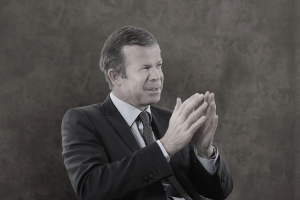X


H.S.H. Prince Max von und zu Liechtenstein is the Chairman of the largest royal family-owned private banking and asset management group LGT, and the founder of Lightrock and LGT Venture Philanthropy.

“I’m convinced there is a significant opportunity to have a bigger and better impact by exchanging ideas, experiences, and practices. There is value in learning from each other in philanthropy, also across cultures. The vibrant culture of giving in Islam dating back to the 7th century is deeply impressive to me.”
Please tell us more about the philanthropic activities of your family?
My family maintains a long-standing and very active commitment to philanthropy. This is rooted in our values and beliefs, and in our conviction that wealth itself isn’t a purpose, but a responsibility – not only for the family, but for broader society.
While our philanthropic efforts in the past did not have a direct link with our businesses, we decided to change that when I formed LGT Venture Philanthropy more than 15 years ago. As a family we are now committed to allocating a minimum of 10 percent of our annual dividends to philanthropic causes. This institutionalised link to the business had a very positive motivational effect on LGT and its employees. It resulted in a more professional and long-term oriented philanthropic effort that has also become more appreciated by the broader family. Within LGT Private Banking, we have more recently built up a Philanthropy Advisory Team to better share knowledge, and networks and to improve philanthropic impact.
How can we all contribute to making a more positive impact in our communities?
Most importantly, the desire to make a difference needs to be seeded and cultivated. Ideally, that desire can already be ingrained into the value system of our children through family and school education. Of course, it should then be reinforced over time through inspiring role models, good values in business and politics, and in our social behaviour. If the desire to make a positive contribution is strongly established, people will find a way to make it happen in line with their abilities – at a familial, social, corporate, and political level – the more, and the more consistent, the better.
Unfortunately, many people were taught over decades at the leading business schools that the sole social responsibility of business is to make profits. I disagree with that thinking. Of course, businesses need to prosper financially to have an impact, but businesses typically have a very diverse impact on society and the environment. To suggest that they should narrowly focus on the maximisation of profits goes against their nature. Unfortunately, this narrow philosophy around shareholder value maximization has caused a lot of unnecessary damage. Far too many businesses have ignored their externalities, and as a result, their footprint in the environment and in society has been far worse than what it should and could have been.
Having pursued a career in business, I have on one hand tried to promote a much more holistic business philosophy, while on the other hand seeking to integrate proven business principles into philanthropic approaches. We apply the same standards of quality and level of professionalism in philanthropy as in business and investment management – across all activities including due diligence, reporting, human resources, marketing, finance, etc. This ensures both targeted and efficient giving, as well as the ability to continue doing so over time.
What pieces of advice can you share with us on how to be even more impactful?
I’m convinced there is a significant opportunity to have a bigger and better impact by exchanging ideas, experiences, and practices. There is value in learning from each other in philanthropy, and also across cultures. The vibrant culture of giving in Islam dating back to the 7th century is deeply impressive to me.
To broadly institutionalise a more holistic approach to business and investment management could drive a lot of positive change. I am a strong believer that we need to integrate the impact dimension into all our business and investment decisions. In the past, we have optimised investment and business decisions around the risk and return dimension, in future we should optimise around risk, return, and impact.

Officially registered as a humanitarian organisation with the Charity Commission for England and Wales in 2019, Intisar Foundation is the first charitable organisation in the Middle East dedicated to providing psychological support programmes of drama therapy to Arab women affected by the brutality of war and violence.
Intisar Foundation
McCarthy Denning, Suite 102,
70 Mark Lane, London, EC3R 7NQ
UK Registration Charity Number: 1182384
Leave a Reply